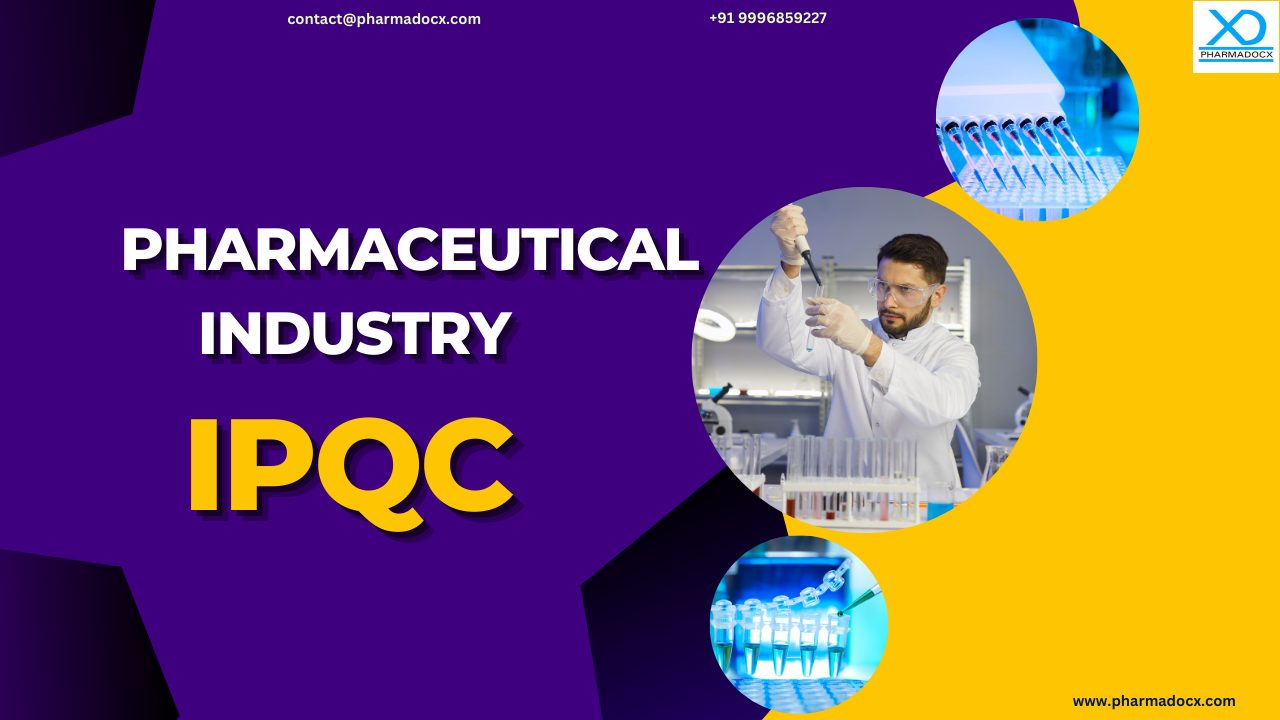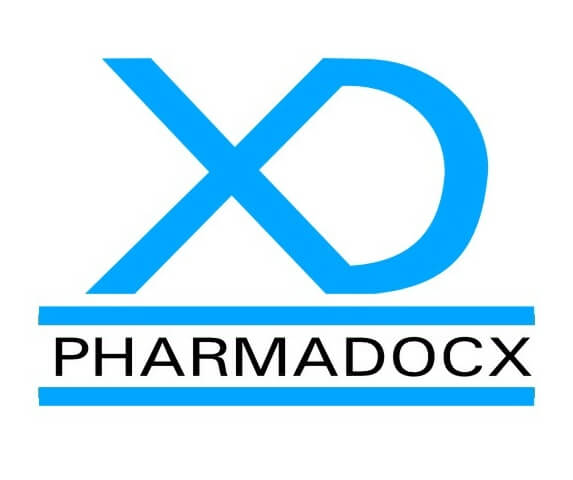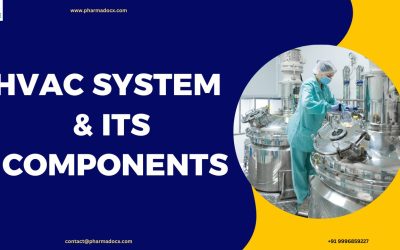Pharma companies are required to prevent substandard pharmaceuticals from entering the market. Thus, drugs have to be tested for efficacy, quality, and safety. Additionally, regulatory bodies require pharma companies to test the drugs manufactured for identity, strength, purity, and stability. Hence, in process quality control is required in pharmaceutical industry. Process quality control regulates the different stages of drug production. Drug production stages monitored are raw material inspection, manufacturing process, in-process controls, and dispatch of finished products. Furthermore, current good manufacturing practices also require a well-written process control procedure for monitoring the performance of the manufacturing process. In this blog, we will focus on what is IPQC in pharmaceutical industry and its objective and importance.
What is IPQC in pharmaceutical industry?
IPQC in pharmaceutical industry provides guidelines for the various checks that have to be performed in the different stages of the drug manufacturing process. It focuses on quality control in the input process of raw materials, drug production, and packaging of the finished pharmaceutical. The aim of in process quality control in pharmaceutical industry is to monitor the drug manufacturing process. Moreover, it even focusses on the quality of the raw materials, equipment, and production environment. Additionally, if required, in order to comply with industry regulation and specifications, in process quality control (IPQC) may warrant modification of the manufacturing process. Furthermore, IPQC guidelines also require in-process materials be tested for quality, identity, strength, and purity. In-process materials that fail to pass these quality tests should be identified and placed under a quarantine system to prevent their future use in the manufacturing process.
Written standard operating process (SOP) for IPQC covering the different stages of drug production should be formulated. Capsule filling, compression and coating, liquid filling, and pharmaceutical packaging also fall under the purview of IPQC SOP.
Thus, IPQC is a planned approach used to monitor the materials, equipment, processes, and operators involved in the drug manufacturing process. From receipt of raw materials to the release of finished pharmaceuticals for distribution or sale, everything is regulated. Furthermore, IPQC tests have to be carried out at regular intervals during the drug manufacturing process. These tests vary depending on the dosage type and form.
What is the goal of IPQC in pharmaceutical industry?
The goal of IPQC in pharmaceutical industry is to identify any quality issue in the drug production process and prevent it from entering the next production stage. Notably, IPQC does not just identify the issues, it focusses on preventing the issue from aggravating. IPQC aims at identifying existing quality issues in the manufacturing process and providing actionable next steps for quality improvement. In process quality control focusses not only on product quality but also personnel, equipment, and manufacturing environment.
What are the key pharmaceutical industry IPQC focus parameters?
- Right material
- Right amount
- Right time
- Right place
Who is responsible for carrying out IPQC in pharmaceutical industry?
Quality compliance and production personnel are usually responsible for carrying out IPQC tests.
Where is the pharmaceutical industry IPQC test usually carried out?
IPQC tests are usually carried out in the drug production area as long as they do not pose any risk for the production process.
Factors that have a vital role in making IPQC effective and efficient
- Operational personnel and staff
- Staff training and management
- Manufacturing process
- Manufacturing equipment and instrument
- Drug manufacturing and production environment
- Effective communication
Process checks that form a vital part of IPQC
- Checking and verification of material details, such as material name, material code, control number, etc.
- Calibration, verification, and checking of the status labels of all the equipment and instrument.
- Cleanliness of the production area and line clearance
- Obtaining data, such as temperature and humidity, on the room environment
- Checking and verification of the status labels on the area and process containers
- Time limits at all stages of the production process
- Checking and verification of the yield at various stages of the drug manufacturing process
- Online review of batch record at every stage of the production process
- Checking and verification of product attributes, such as weight, pH, dissolution, hardness, particle size, and dissolution
- Establishment of the finished product standard in the drug production department
- Analysis of the first product of a batch from the new product line or a line that has changed products
IPQC test for different pharmaceutical products
Solid tablets
- Disintegration time
- Weight variation check
- Hardness
- Friability
- Dissolution test
- General appearance test
- Leakage testing for strip and blister packaging
- Content uniformity
Liquids
- pH test
- Visual inspection
- Uniformity of content in the liquid
- Particle size determination and analysis
- Determination of phase
- Proper sealing check
- Filled volume check
Basic IPQC tests for sterile products
- Leakage test
- pH analysis
- Volume test
- Sterility test
- Clarity test
- Potency test
- Conductivity test
Importance of IPQC in pharmaceutical industry
IPQC in pharmaceutical industry prevents substandard drugs from entering the market. Thus, pharmaceutical industry IPQC has a vital role in patient safety and protection of public health.
- It can spontaneously detect any quality lapse in the drug production process. Simultaneously, IPQC provides actionable next step to address the identified issues.
- It enforces drug manufacturing, packaging, and operational quality principles and guidelines.
- It can detect errors and issues in the drug manufacturing process.
- It provides accurate, specific, and definite guidelines for the drug production procedure.
- It can minimize human errors in the drug production process
What is the inspection process for IPQC in pharmaceutical industry?
First inspection
First inspection is used to identify lapses early on and prevent multiple batches of products from being wasted. It is the inspection of the first piece. The first inspection can help identify wrong installation or positioning of tools or wrong input of materials or formulas. Additionally, it can help identify instrument wear and tear and deteriorated precision of measuring instruments. Thus, corrective measures can be implemented to prevent manufacturing an entire batch of substandard drugs.
Patrol inspection
In patrol inspection, recently produced pharmaceuticals are sampled to evaluate whether they meet the specifications in guidelines and standards. It has to be carried out in a specific order at fixed time intervals and routes. Furthermore, in mass production, patrol inspection is usually performed with process control chart to avoid anomalies in mass production process. This has to be done to prevent manufacturing multiple batches of substandard products. The inspection is performed by inspectors at the work or production sites.
Last off inspection
After the production of a batch of pharmaceuticals is complete, the last product is sampled for full inspection. In the last off inspection, quality of the drug production process is evaluated based on moulds or installations. In case of issues in the moulds or installations are identified, they are repaired before the next production process begins. Thus, last off inspection helps correct issues and errors prior to commencing the next production process.
IPQC in pharmaceutical industry has a vital role in maintaining the quality of drugs
IPQC in pharmaceutical industry is vital and beneficial. The aim of pharmaceutical industry in process quality control is to ensure the product quality by checking the production processes. It not only provides a means of controlling production but also performs quality assurance of the drug production process. Moreover, IPQC helps identity lapses at an early stage that can be corrected early on the manufacturing process. Thus, it helps minimize material and time loss by reducing the number of process repetitions required. Thus, IPQC has a vital role in improving the quality of pharmaceuticals being manufactured. Regulatory bodies require pharma companies to incorporate IPQC in their drug manufacturing process. For guidance on pharmaceutical industry IPQC, drop an email at [email protected] or call/Whatsapp on 9996859227.





